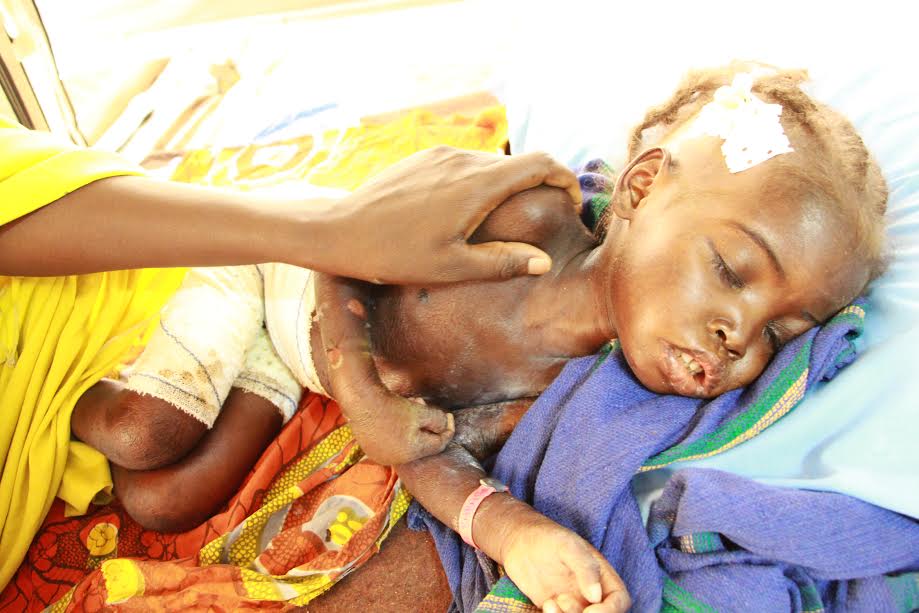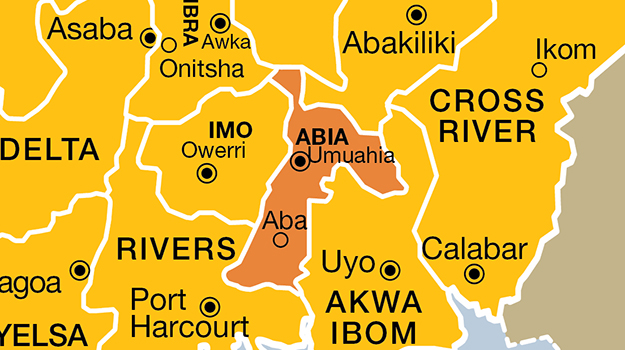In October 2016, the senate began probing the alleged diversion of funds and relief materials meant for Internally Displaced Persons (IDPs) in Borno state. After disguising as a relief-aid donor — for eight straight days in November — in order to penetrate an IDP camp and the Borno State Emergency Management Agency (SEMA), ‘Fisayo Soyombo, editor of TheCable, presents a report that points the senate committee to the directions where it should beam its searchlights — if it is any serious about apprehending and prosecuting the government and camp officials who have been piling more misery on people whose lives have already been made difficult by the Boko Haram insurgency.
At the tender age of three, Halimat is experiencing a torture that even a 30-year-old would struggle to withstand. At the 110-bed Inpatient Therapeutic Feeding Centre (ITFC) of the Médecins Sans Frontières (MSF) in Gwange, Maiduguri, where she was first spotted in early November, Halima lets out a cry every time she turns on her sick bed. Almost every part of her slender body is swollen, wrinkled or bruised; half of it is bandaged. She is suffering from severe acute malnutrition, worsened by constant diarrhoea and oedema — a buildup of body fluid that results in a swollen body and causes severe pain.
A doctor painstakingly examines her body to find a vein through which to catheterise her since she cannot eat manually. After 10 minutes of fruitless search, he settles for a spot on her head just by her right temporalis. It’s all part of a string of medical process aimed at preserving Halima’s life, but it first causes her excruciating pains. Her mother, Yagana, watches in despair, arms akimbo, tears coursing down her cheeks in utter helplessness.
To be clear, Halima is in this state of pain for two reasons: first, she was let down by her country, which failed to protect her when Boko Haram insurgents attacked her household in Bama in 2014; next, she found food hard to come by, not just because of the enormity of the feeding burden on the government but because of the inhumanity of emergency managers and camp officials who “keep diverting” IDP foodstuffs.
Advertisement
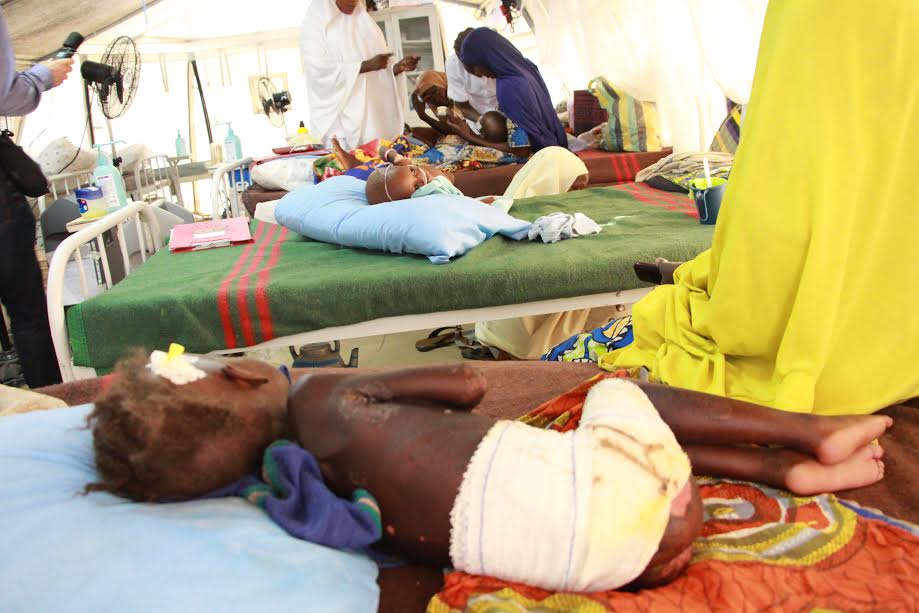
Three days after arriving the medical facility, Halima gave up the ghost. Those who saw Yagana on the day of her daughter’s death said she was disconsolate. Amidst her wails, she was quoted to have said she had “lost all hope for the future”.
Not a difficult image to picture, really. When Boko Haram raided her village, the 100 cows that constituted her means of livelihood were seized. More than 20 of her relatives, including her husband, were killed, leaving her with six children — all severely acutely malnourished — who eat nothing other than maize porridge only every other day. Now, one of those, the youngest, had just died in the most harrowing of circumstances.
The statistics behind the crisis
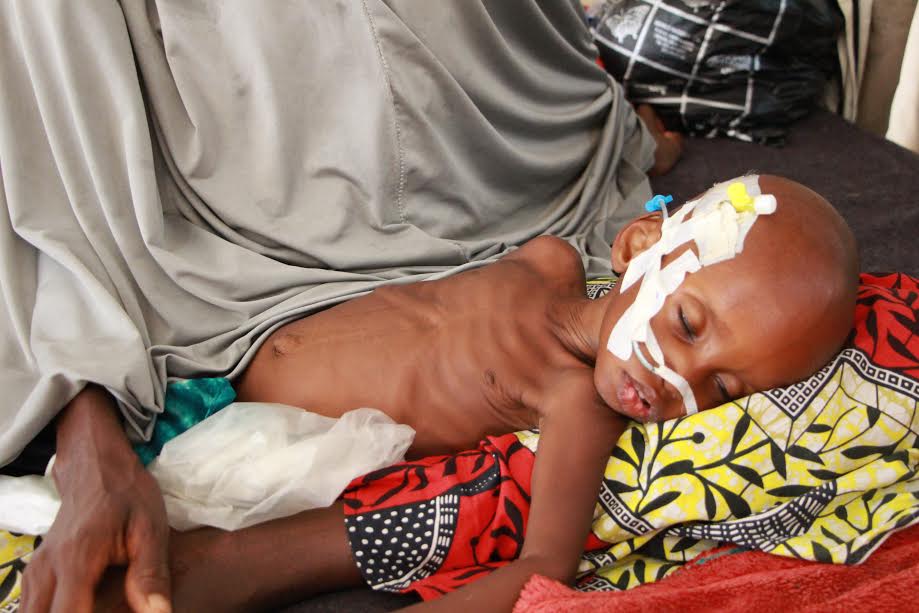
Halimat and Yagana are not alone in their misery. According to an MSF survey of the humanitarian crisis in Borno, shown to TheCable by a presidency source, 3.7 per 10,000 children under five years old died per day between December 2015 and September 2016. The sheer scale of this crisis forced the federal government, in June, to belatedly declare a nutrition emergency in Borno — belatedly because the United Nations-recommended emergency threshold is 2.1 deaths per 10,000 under-five children per day, and also because it took a survey by a foreign aid agency for the government to take the step.
Advertisement
The displaced persons alive are faring only slightly better than the dead. In mid-June, after 1,200 people, mostly women and children, were evacuated by the army from Bama to the Nursing Village camp in Maiduguri, MSF screened 466 children from six months to five years of age; it was discovered that 39% of them were suffering from severe acute malnutrition. Also in Bama, a rapid nutritional screening of more than 800 children showed that 19% were suffering from severe acute malnutrition.
Epicentre, MSF’s epidemiological centre, conducted retrospective mortality surveys and nutritional assessments from August 19 to September 9 at Muna Garage camp, and from September 23 to 29 at Custom House camp. At the latter, severe acute malnutrition among the children under five years old (the most severe form of malnutrition exposing children to a high risk of death) was estimated at 4.3% and moderate acute malnutrition at 15.6%.
At the former, 9.5% of the children under five were affected by severe acute malnutrition and 15.4% by moderate acute malnutrition. Therefore, a total of 24.9% of children under five years old were affected by general acute malnutrition — a rate well above the 20% emergency threshold.
Advertisement
All these statistics point towards a population of IDPs in severe pains, due particularly to a food-shortage crisis. Being the ones in closest contact with the displaced persons, the SEMA and camp officials ordinarily ought to be the most sympathetic about the people in their care. Sadly, findings from visits to the groups showed otherwise.
Diary: Undercover expedition to Bakassi IDP camp
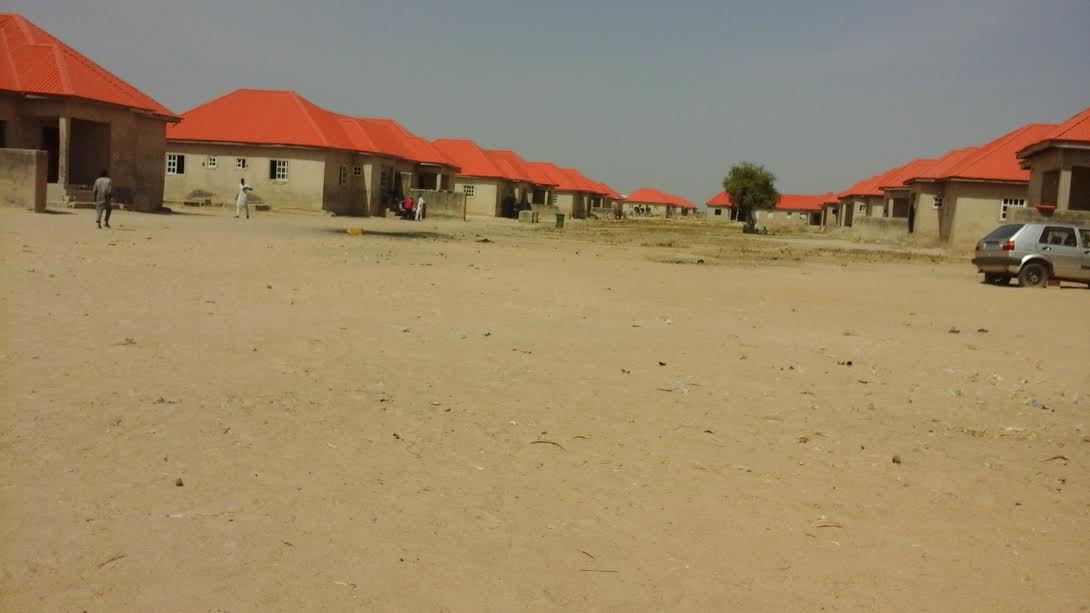
Camp and Borno state government officials have invented an ingenuous way of keeping journalists off IDP camps. No journalist is allowed entry upon arrival at the camp. Instead, he is first directed to SEMA to submit an application letter that finds eternal abode in one of the dusty files at the relief agency. The practice is to direct the journalist from one office to another, on and on until frustration sets in and he is forced to abandon the mission.
But after five days of relentless failing and retrying, I finally make my way into Bakassi IDP camp, located on Damboa Road — not as a journalist but as a potential donor of relief materials to the displaced population. I explain to the camp officials that I need to first see the camp to be able to assess the needs of IDPs, and then return at a later date with a reinforcement of relief items. I expect them to immediately facilitate my movement into the camp, but surprisingly four of them ease me out of the general office into a ramshackle, deserted room where all sorts of irrelevant questions are asked.
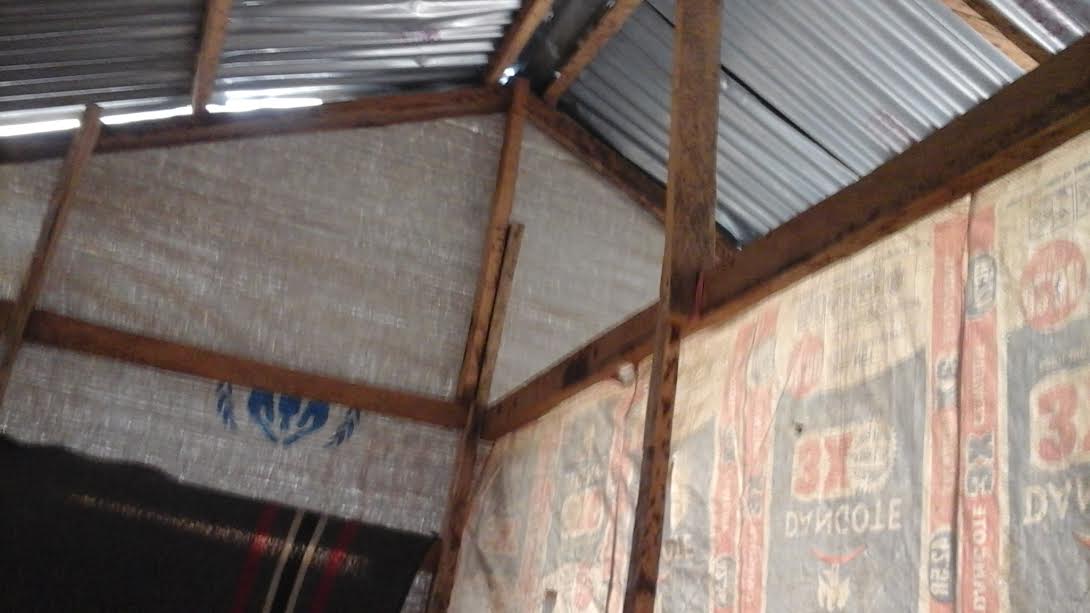
“How much exactly is the worth of the donation you’re planning?” one asks. I ignore him the first time but he doesn’t give up. Instead, he adds: “I ask so that I can tell you the kind of materials that you should go for.”
Advertisement
When I mention some figure in the region of thousands of US dollars, his face brightens. He dips his hand into his pocket but I notice he doesn’t immediately withdraw it. “I think we should allow him enter,” he tells his colleagues.
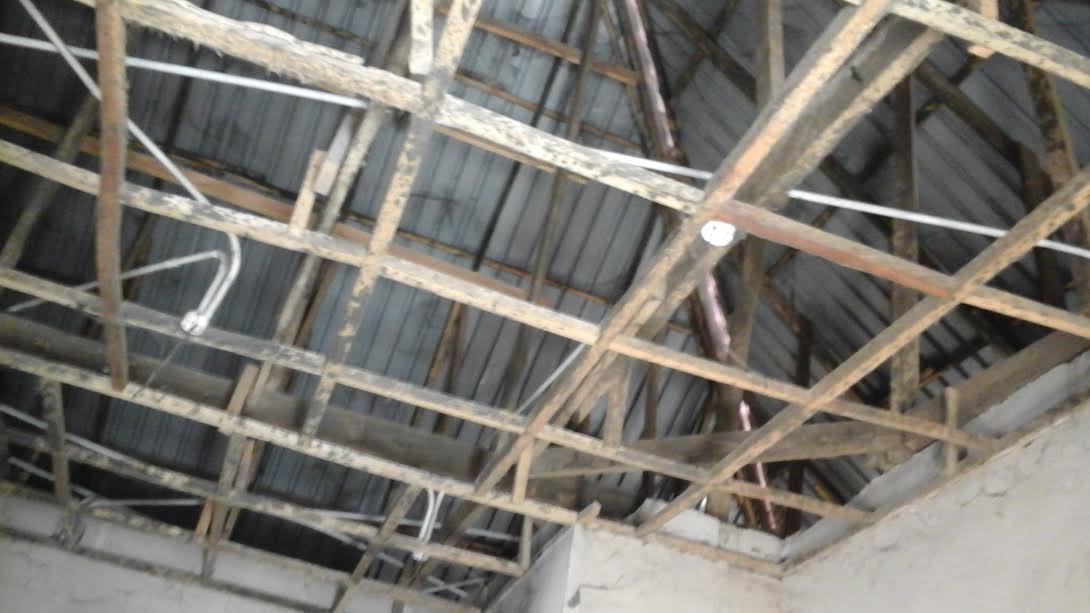
And just as the trio face the door to take their exit, he quickly slips his complimentary card into my hands. We all leave, the other three oblivious of what had just transpired.
Advertisement
‘We are in extreme hunger’
One camp official was instructed to follow me in all my movements but Bakassi camp is such expanse that I knew the official would soon tire and would in no time sit somewhere and allow us move freely.
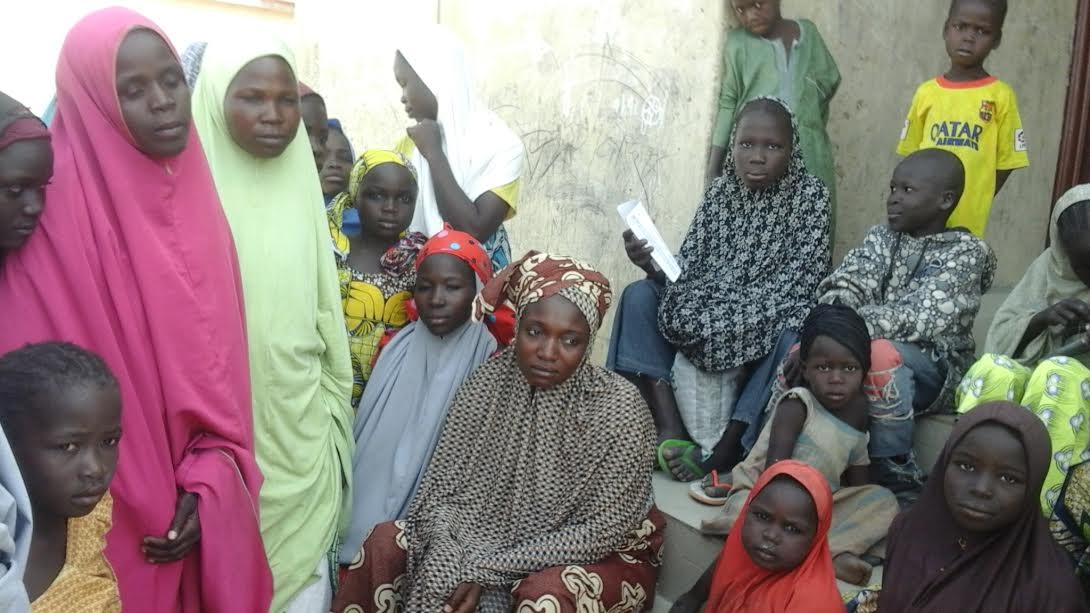
By land mass, it is the biggest of a dozen official IDP camps in Borno state. Set up on January 25, 2015 with a population of 4,763 IDPs from Monguno, Gwoza, Guzamala, Marte and Nganzai local governments, Bakassi IDP camp has grown in approximately two years to its current population of 21,202. The bulk of the population, though, lives in extreme hunger.
Advertisement
Asked what kind of support a relief agent could render, the first batch of IDPs on ground choruses: “food!”
“The food here is not enough for us; we are in extreme hunger,” says the slender mother of four who acts as their mouthpiece. “To compound our woes, we sometimes have no choice but to sell a part of the food to people outside the camp in exchange for other things we need.”
Advertisement
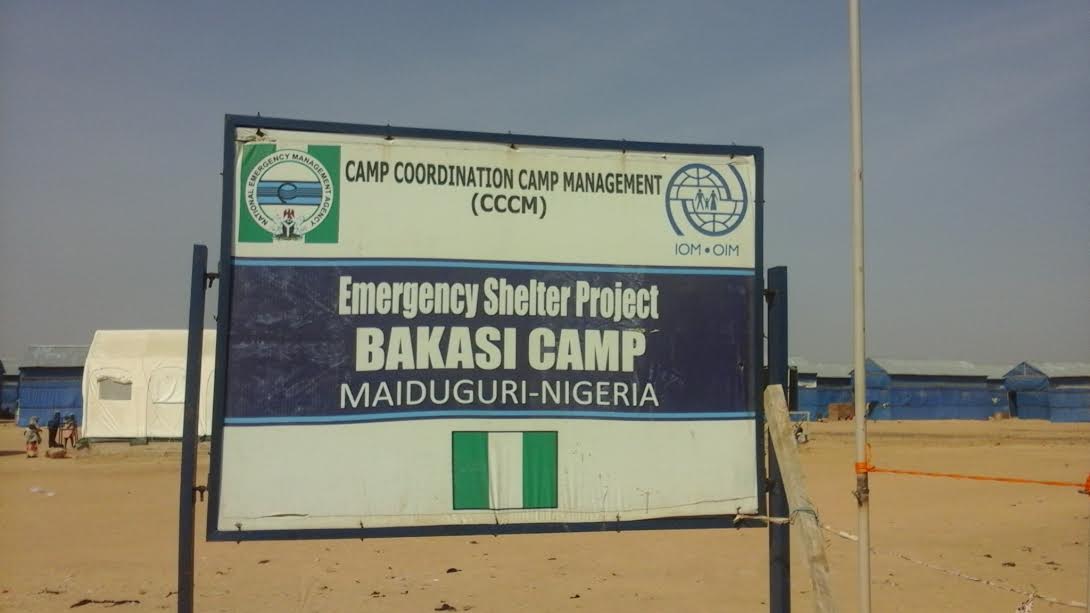 There isn’t so much she can say, it would seem, with the prying eyes of the camp official roving from one IDP to another. Half-an-hour into the fact-finding mission, the camp official motions me to himself.
There isn’t so much she can say, it would seem, with the prying eyes of the camp official roving from one IDP to another. Half-an-hour into the fact-finding mission, the camp official motions me to himself.
“Let me sit down over there while you finish your work,” he says, pointing at a nearby pavement. “I’ll be waiting there till you’re done.”
‘Let me tell you how SEMA diverts food’
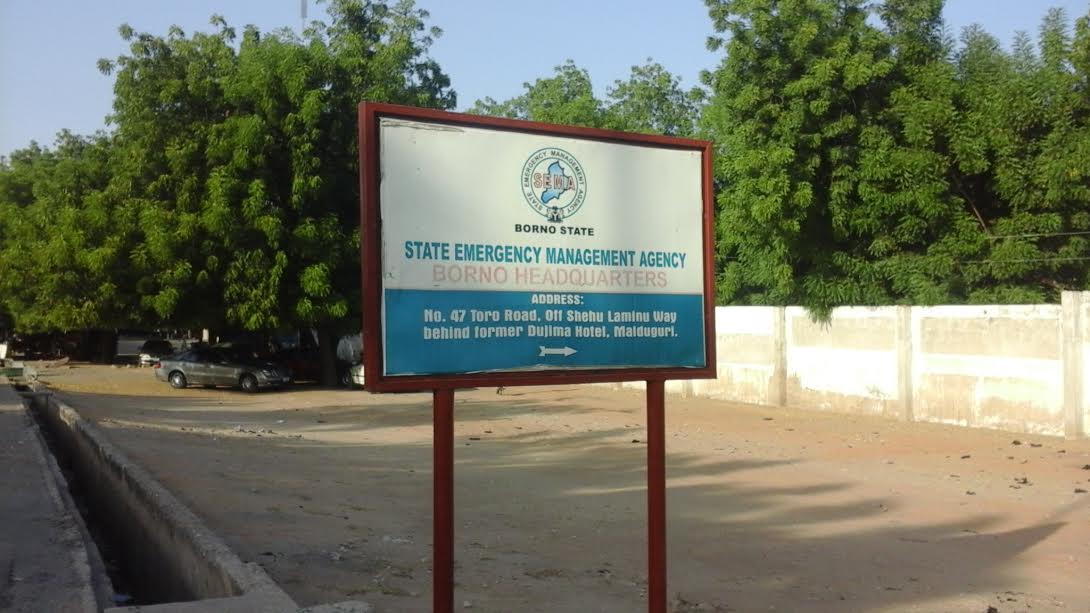 Before walking towards the spot that he had marked out for rest, the camp official explains why it is natural that IDPs will continue complaining of hunger.
Before walking towards the spot that he had marked out for rest, the camp official explains why it is natural that IDPs will continue complaining of hunger.
“You see, let’s face it, it is extremely difficult to satisfy millions of hungry people. It is impossible to feed millions of displaced persons and expect all of them to be satisfied. But at the same time, the food entering the camp from SEMA is lesser than what has been passed on to them from NEMA,” he says, unaware that he is actually talking to a journalist.
“Let me tell you what SEMA does. They divert food meant for IDPs to private quarters. They actually re-bag grains meant for IDPs and re-sell at the open-air market. These bags of grains that are diverted, they claim that they are giving them to IDPs in host communities.
“It’s very smart move from these SEMA officials because they know that there’s no documentation for IDPs resident in host communities. Of course, this particular IDP population exists, but you can’t track their number. It is this loophole that SEMA exploits to divert aid meant for IDPs.”
‘They don’t give us all the food they get’
Although the next woman asks to remain anonymous for fear of being victimised, she discusses not only the problem but the reason it exists.
“We don’t have enough food,” she says through an interpreter, her forlorn look and gnashing of teeth making an unsavoury combination.
“Our children are living here with us without food. They give us rice without firewood; no medicine to take care of ourselves during ill-health. Please come in and see where we sleep; just floor without mattress.”
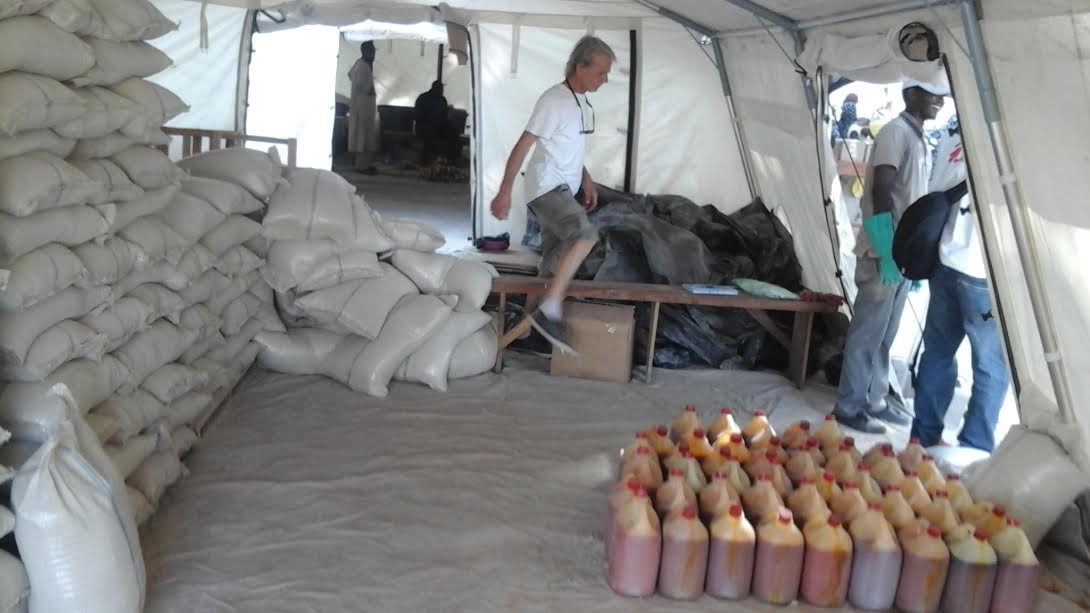
The blame, she maintains, is the camp officials’.
“It is true that there’s some hanky-panky with food items. When food arrives the camp, they don’t give us everything,” she says.
“They give us some and keep some back. The foodstuff that they hold back in the store, they do not share for us until another batch of food arrives at the end of the month.”
‘SEMA is the main problem’
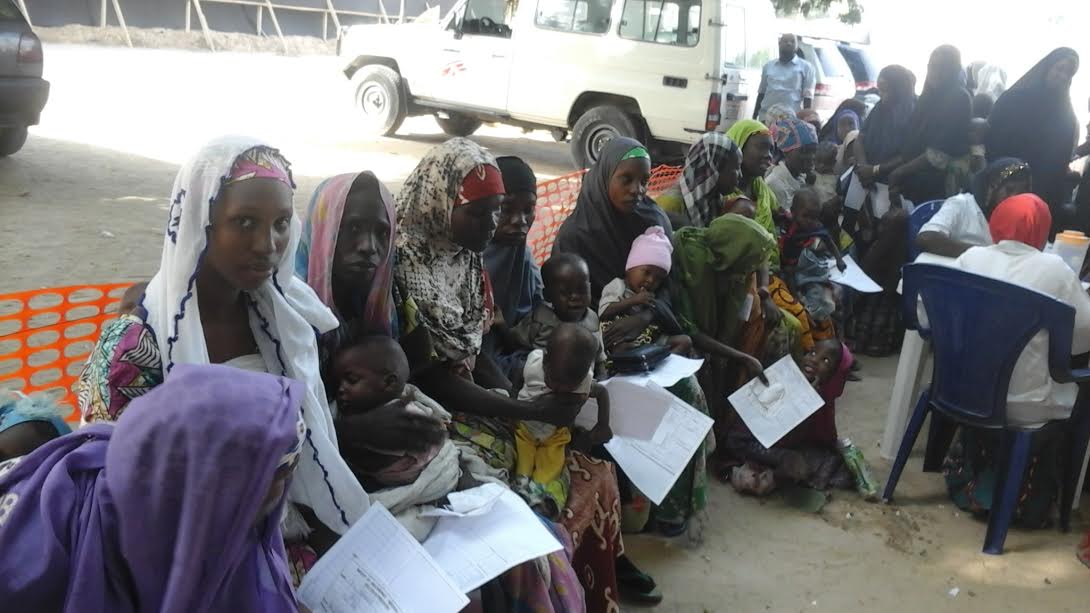
These claims were corroborated by another displaced person, although he thinks the theft of food items in IDP camps is “child’s play” compared with the happenings at the state emergency management agency.
“If you can give 25kg of rice (which is 7.5modules) to a man with nine family members to care for, for one month or for 45 days, what is that?” he asks, visibly miffed.
“What do you call that? How would you give someone five modules of corn to eat for one month? No charcoal, no firewood. They have to sell three to five modules of the rice to buy charcoal.”
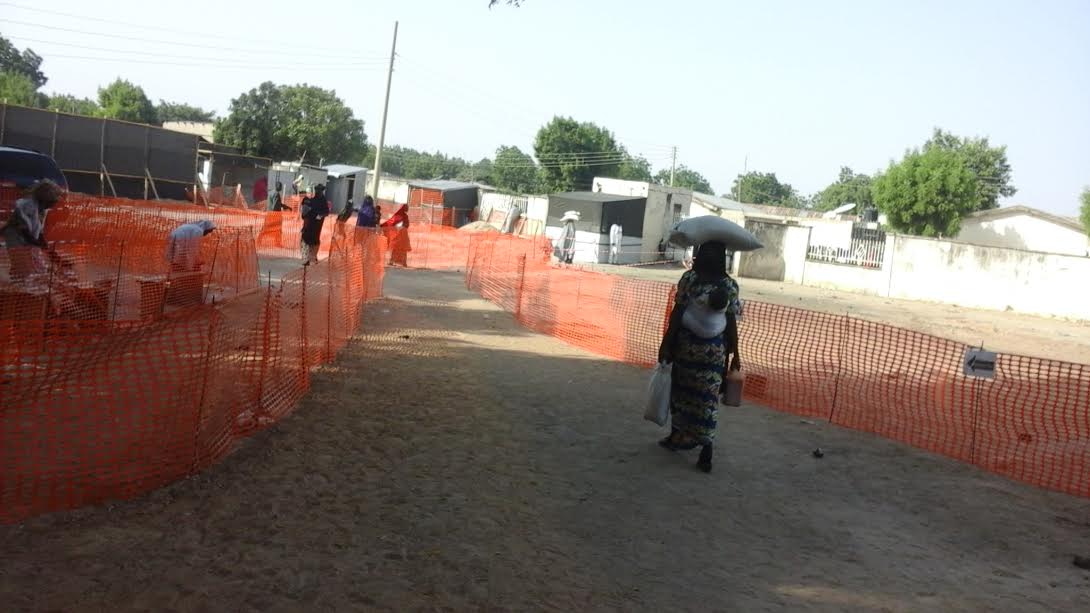
The “main problem”, he says, is that the food entering the camp is inadequate despite the huge food inflow to SEMA.
“In fact, in this camp, there are people from Gwoza who have never received food since they came in. People are saying that they don’t know what to do. They can’t return to Gwoza; they are not comfortable here. They have to stay back here and just manage it.
“The bulk of the food theft is from SEMA. Before, if you were a family of nine to 10, you would get 100kg of rice. But they later reduced it to 50kg.
“The national chairman of NEMA came to this camp in October and said that they were bringing food for us. In fact, he said they had food that could last us for two months. So, if they had surplus of two months, how is it possible that our rations have been cut by half? He said it that NEMA was giving enough food to SEMA. So the question to ask SEMA is: why they are reducing our food?”
Is this a sign?
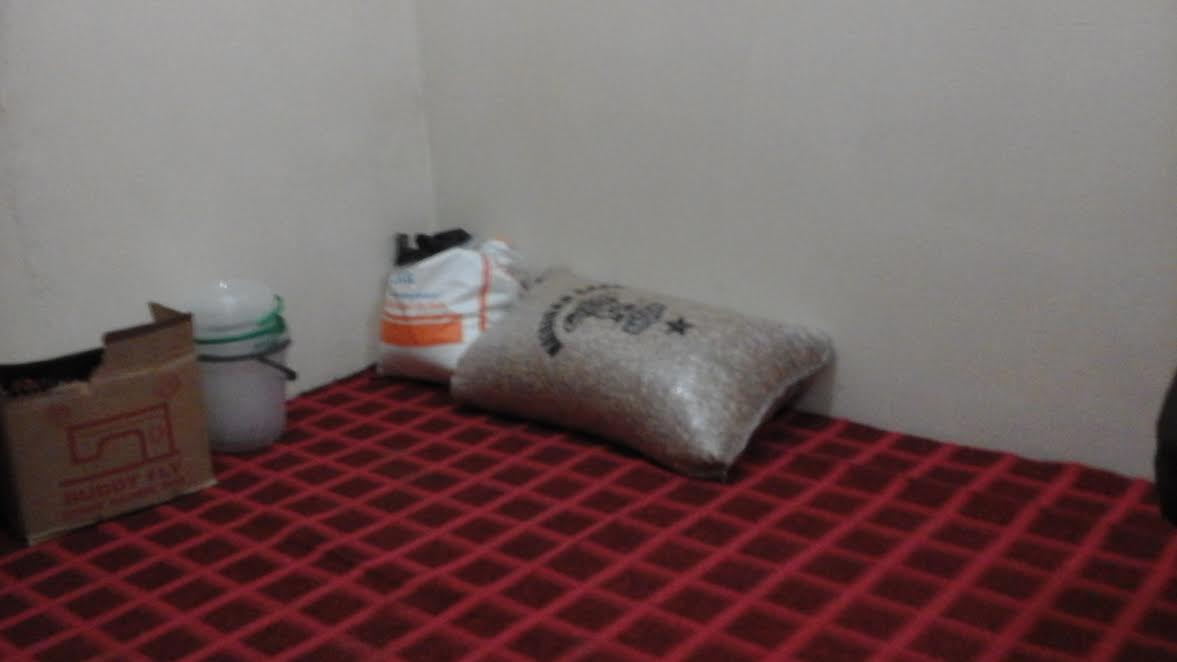 During a visit to the Women Development Centre, Post Office area, opposite General Hospital, to discuss the possibility of entering IDP camps, a bag of beans, another bag of an unidentified product and two sewing machines, were easily noticeable in an office marked ‘Assistant Director’. The sight would have made no meaning but for two reasons.
During a visit to the Women Development Centre, Post Office area, opposite General Hospital, to discuss the possibility of entering IDP camps, a bag of beans, another bag of an unidentified product and two sewing machines, were easily noticeable in an office marked ‘Assistant Director’. The sight would have made no meaning but for two reasons.
One, the scheduled meeting was with a SEMA top shot. What was a bag of beans doing in the office of a man whose job directly relates to the distribution of an item like this to IDPs?
Two, it isn’t once — not even twice — in 2016 that IDPs in Borno had received the donation of sewing machines from public-spirited individuals and organisations.
The source of the items was not established, but their presence surely raised suspicions.
IDP camp officials with ‘bad character’

According to a member of the Civilian Joint Task Force (JTF), whose work covers the Muna Garage IDP camp, relief materials generally — not only food — do not get to IDPs because of the “bad character” of the men in charge.
This wasn’t the first time that camp officials were being spotlighted. In August, displaced persons from two different camps blocked the highways linking Borno to adjoining states in protest of “poor feeding and ill-treatment” at the camps. The IDPS at the Arabic Teachers College Camp were the first to protest, on August 26, and they were followed by those from the Bakassi Camp on August 30.
The protests prompted the state government to scrap its central feeding programme, under which food was cooked at the central kitchen and shared to IDPs, and adopt the household sharing system that allocated raw food to family heads according to family sizes. The IDPs may have succeeded in sacking the central feeding committee, but it appears the problem runs deeper.
“There are IDP camp officials who have bad character; when some donors bring relief materials, these officials pass them on to their families rather than the IDPs who need them,” the Civilian JTF member says.
“Instead, they will hoard it — and in the night, they will take the items to their families and friends. We have that problem in many camps, especially the NYSC Camp, Muna Garage Camp and Bakassi Camp. In these three camps, I have seen this happen. It’s a very terrible problem how officials hoard donations to IDPs.
“This is why IDPs protested recently. They said that people were coming to camps to bring relief items, but these were not getting to them. That is why we need good officials at IDP camps.”
‘SEMA shares half and steals half’
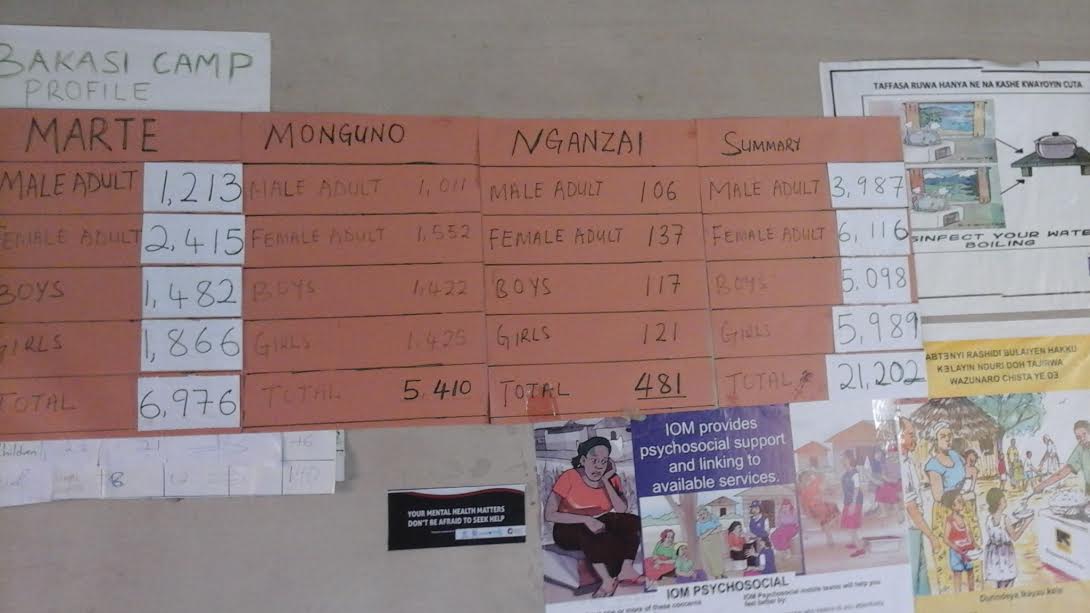
The civilian JTF member concludes by saying SEMA has a policy of dividing into two, the foodstuff it receives from the National Emergency Management Agency (NEMA). Half of this, he claims, actually goes to the IDPs; the other half, nowhere!
“If SEMA collects 100 bags of rice from NEMA, it distributes 50 and keeps 50 in its office,” he says.
“But after a while, they will tell NEMA to send more foodstuff, claiming that they had distributed all the food they got. Even after they have brought the food — thank you — no water! How do you give someone food and you don’t provide water as well?”
3,000 bags of sugar ‘diverted’ during Ramadan
That weighty allegation was corroborated by someone who once worked as a driver at the SEMA office where relief materials are stored. In fact, he says there are times whenSEMA receives aid and keeps all — not just half — of humanitarian aid to itself.
“Let me tell you, they gave SEMA about 3,000 bags of sugar during the Ramadan period. We brought it and they didn’t make use of it; they just kept it till after the Ramadan period and the sugar became solid,” he says.
“Then they started to break the sugar and change the sacks. Then they loaded it in the cars at night, and took it to the flour mill to sell.
“Then they brought people to come and sew the new sacks. When we all left to go home in the evening, they went back to load the trucks at night and head to the flour mill.
“It also includes groundnuts. There’s one that Dangote brought, supplies for the fasting period. They called him [the SEMA chairman] and gave him but he didn’t share it to the people.”
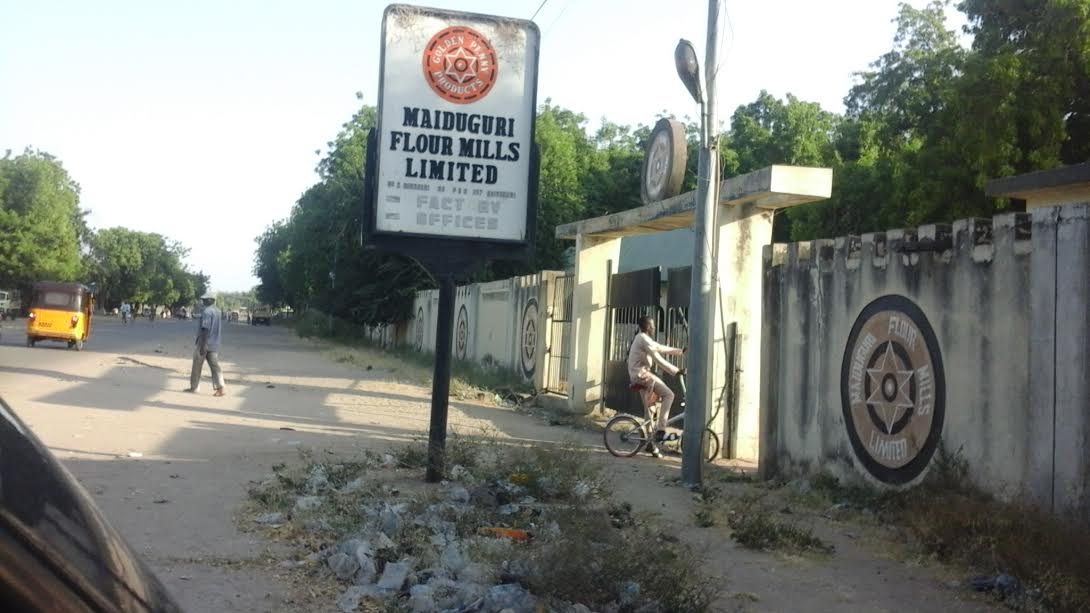 The diversion of these materials, he adds, were perpetrated under the cover of darkness, usually late in the night but sometimes in the wee hours of the day.
The diversion of these materials, he adds, were perpetrated under the cover of darkness, usually late in the night but sometimes in the wee hours of the day.
“I saw them more than 10 times when they were moving the sugar out of the SEMA office. Most of these were very early in the morning, like 5:30am to 6am, and some were in the night,” he says assuredly.
“Every month, the former SEMA chairman gave at least 300 bags of rice to each IDP camp. But now, each camp gets 50bags/month. In the night, they cart the food way and nobody knows where they move it to. Always in the night.
“There was a time that they would send wrappers, cloths from the US…. These people just held everything for themselves. They refused to give people and they were selling the clothes.
“If SEMA will ever agree to open its store, you will see many things inside, many kinds of foodstuff: beans, rice, sugar, Tuwo Shinkafa, noodles, cloth. But if you go to IDP camps, you will never find these things there.”
Although he is unaware that he is talking to a journalist, he prods his listener to confront the SEMA chairman with these “facts”, saying: “When you meet the chairman of SEMA, you can ask him about it.”
TheCable was denied entry to the Maiduguri Flour Mill in an attempt to verify the claim that it collaborated with SEMA to divert the bags of sugar. “We don’t entertain journalists here and we also don’t engage in any sugar business,” the gatekeeper says.
Similarly, the NEMA chairman ignored all calls and the text message to his phone number.
A tale of two SEMA chairmen

Grema Terab is the immediate past chairman of Borno’s SEMA. And by his own account, he is the pioneer chairman of the agency. Appointed in August 2014 at a time the humanitarian crisis was escalating and with 20 of 27 local governments under the control of Boko Haram, Terab’s first task was to coordinate a statewide care for displaced persons. It is unclear how Terab’s tenure panned out in terms of accountability for relief items, but it appears the people haven’t forgotten him just yet — 20 months after leaving office.
In all, two members of the civilian JTF, six IDPs and a former SEMA staff rated Terab a better manager of the humanitarian crisis than Satomi Ahmed, his successor.
“The former chairman was someone who helped everyone, whether you were an IDP or not,” one IDP at Bakassi camp says. “He helped everybody. But this one? He’s just hoarding all the food!”
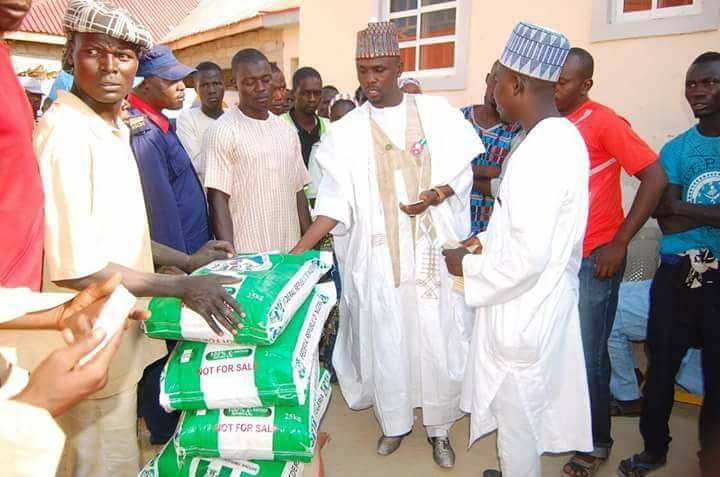
The most damning comparison came from the civilian JTF member quoted in earlier paragraphs.
“This current chairman, Satomi, sometimes he walks on the road and people scream at him, ‘We don’t like you! We don’t like you! We need Grema! We need Grema!’”
Perhaps there were people who were unhappy with the appointment of Satomi, as he is widely known, and they were determined to see him fail. An encounter with him was his chance to invalidate all the accusations against him. But, were he to have the benefit of hindsight, he would want that encounter to go another way.
Two of us masquerading as aid donors from the south-west arrive the SEMA office on a typically scorching morning one Thursday in November, and we are told right at the gate that we have to return for a 1pm appointment.
We return just before 1pm, and once we are in, we immediately see that Satomi wields enormous powers. There is a crowd of people, mostly elderly women, waiting to see him. Alongside the few men and children in the mix, they are all sprawling on the rugged floor in the chair-less yet expansive waiting room.
After a half-hour wait, a pleasant man carrying himself around like one of Satomi’s aides succeeds in helping us pin the chairman down to a corner, during one of the many moments he slid from office to office in the gigantic edifice. “Give me 10 minutes,” Satomi says curtly, coldly.
Thirty minutes turn to an hour, an hour extends to two. Still we wait. On that rug, we doze off, wake up, and find out we have been waiting not for 10 minutes but for nearly three hours. We seek out this aide, and tell him it’s now or never. He pleads with us to be a little more patient “for the sake of IDPs who need the kind of donation you say you want to give”.
Not long after, Satomi leaves his inner office for his aide’s, where we are luckily loitering, and his aide reminds him in courteous English that we are still waiting. It is unclear why Satomi is suddenly infuriated, but he scolds his aide in unprintable Hausa. When, on Satomi’s exit, we ask the aide if we stand a chance of seeing his boss anytime soon, the once happy man simply scowls at us.
We are still trying to figure out our next line of action when Satomi charges out of the office — and without uttering a word — dashes past us and out of the building, enters his SUV in the company of three other aides, and drives out of the premises.
“What manner of SEMA chairman refuses to meet potential aid donors, refuses to apologise for not being able to meet them, refuses to give them another appointment, refuses to delegate one of his subordinates to meet them?” my co-‘humanitarian worker’ asks me.
“No idea!” I reply.
Meanwhile, IDPs are suffering…
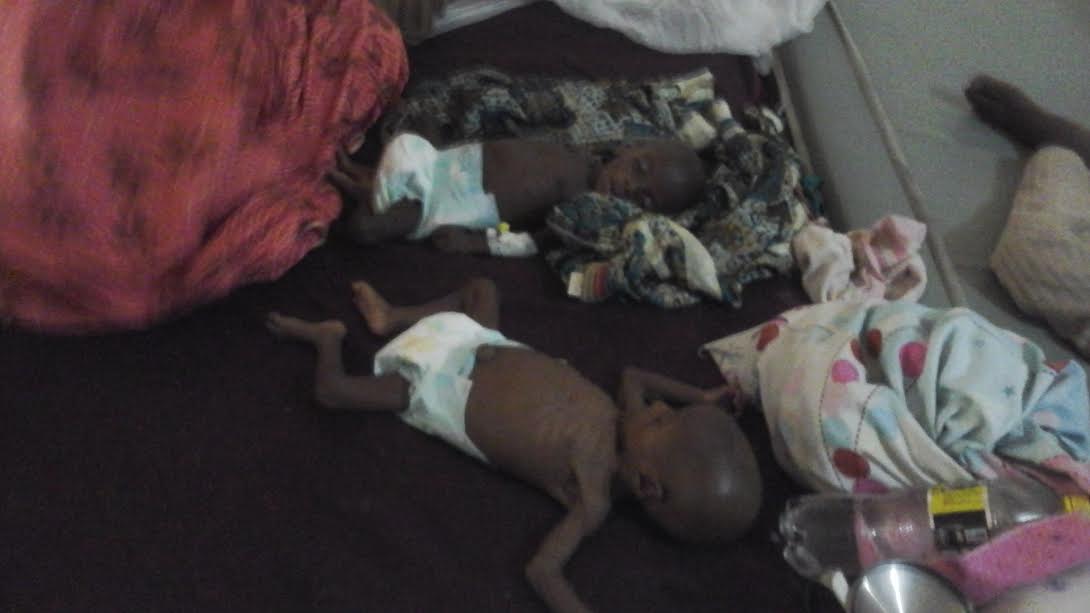
Had we truly been prospective donor of relief items to IDPs, we would have been frustrated by Satomi. Yet millions of IDPs remain in dire need of every help they can possibly get.
For example, 26-year-old Fatima Adamu of the Bakassi IDP camp is struggling to keep her twins, Hassana and Husseini, alive. Both babies are severely acutely malnourished and are now fighting for their lives at the MSF health centre.
Originally from Gwoza, Fatima left Yola in 2013 after one of Boko Haram’s numerous raids. She was initially at the Arabic Teachers Camp (ATC), but two years ago, she was relocated to Bakassi Camp.
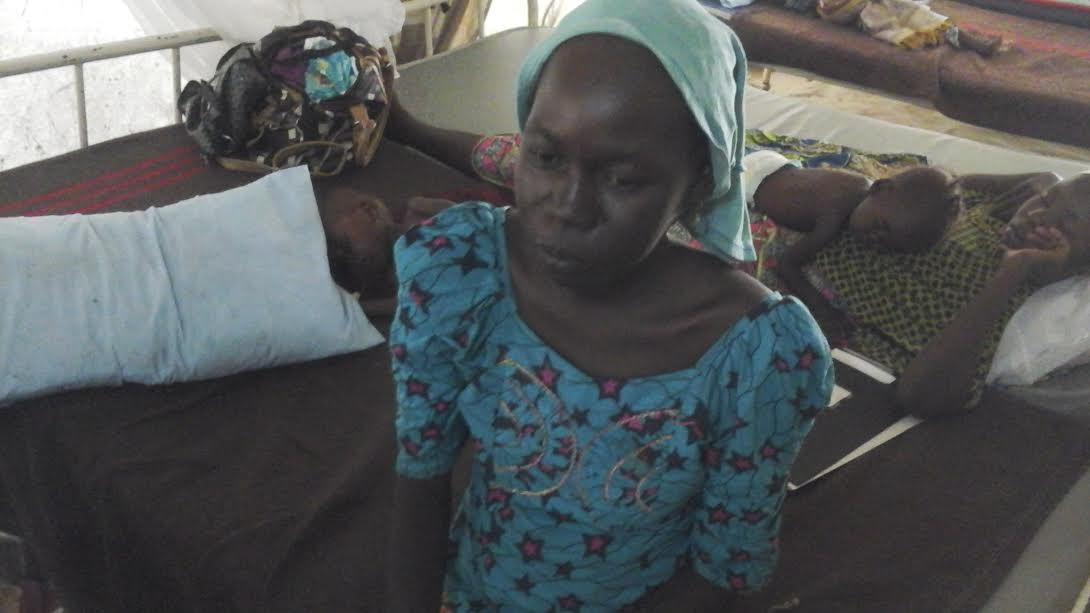
“In the two years I spent at ATC, we had food prepared for us but now at Bakassi we get food rations,” she says.
“The problem is that at Bakassi, the children don’t get milk. When I accosted SEMA officials to ask why we weren’t getting milk, they said the supplier of the milk had been busy with other things.”
Yagana Bura, 30, from Dikwa LG would also be grateful to receive the kind of aid that Satomi didn’t seem to bother about. Moved from ATC to Bakassi Camp, Yagana has never had enough food at any of the IDP camps she has lived in. As a result, her child is on admission for complications from malnutrition.
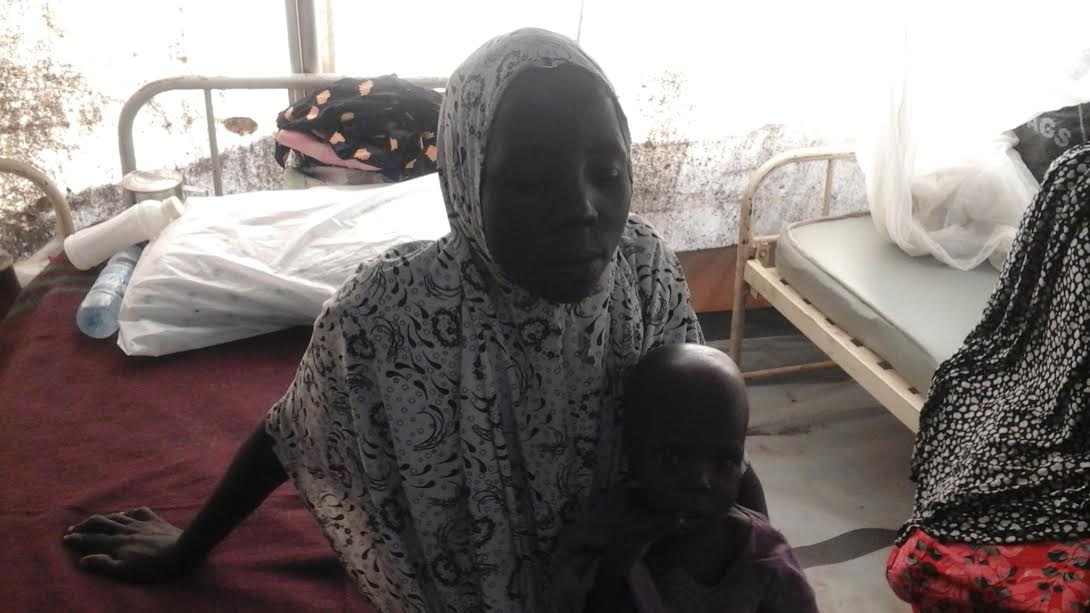
“When we were in ATC, they gave us a cup of ground corn just once in a day. Usually, it wasn’t enough, so what I did was hand it over to my children while I sorted myself out,” she says.
“At Bakassi we get food but it is never enough, so it finishes before the end of the month. When food finishes, we go outside the camp to beg. In Bakassi, four people get 1bag of rice (25kg) and 1 bag of beans.”
… and their children are fighting for their lives
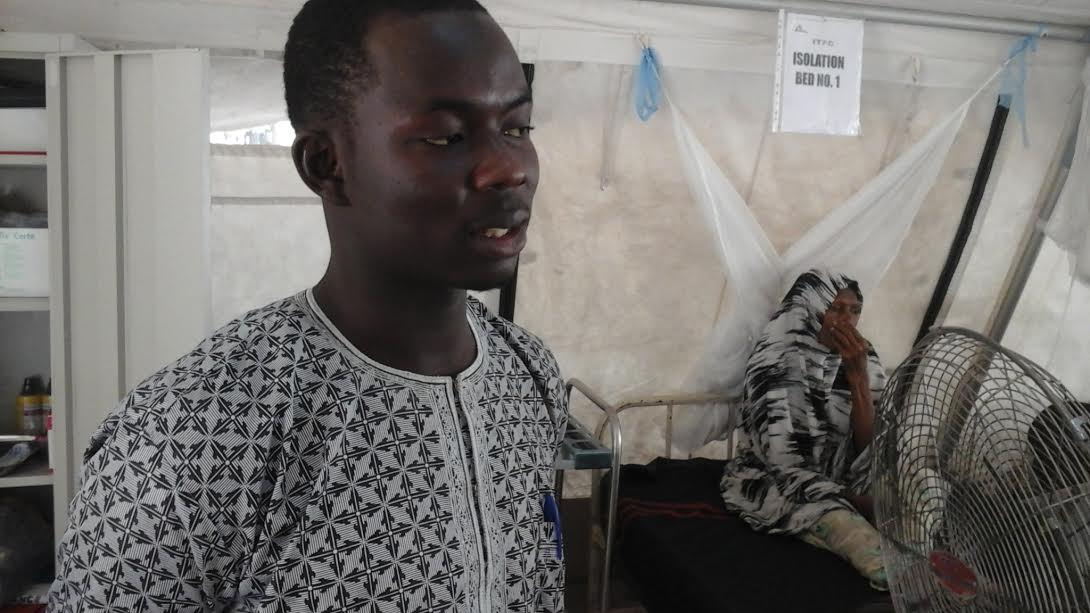
At the Isolation Unit of the MSF ITFC, where the most severe malnutrition cases are being managed, Mohammed Lawan Tijani, the nurse, says the major complications are measles and chicken pox.
Tijani cites the case of siblings Umar, Fatima and Hussein Hudu who are all hospitalised for measles. “One person got it and the others contracted it,” he says.
There is also Fatimat Usman, aged just 22 months, suffering from whooping cough as a result of malnutrition. In the five days that Fatimat has been there, her mother, Khadijat, has known virtually no sleep.
On the next bed are Abdullahi and Ali Abubakar from Gudumbali in Guzamala local government. Ali, just four, arrived the facility in great discomfort.
“His case was really serious,” says the nurse. “He was restless; he could neither stand nor sit; he couldn’t even walk; he couldn’t eat. But now, there is remarkable improvement.”
Improving the living conditions of IDPs
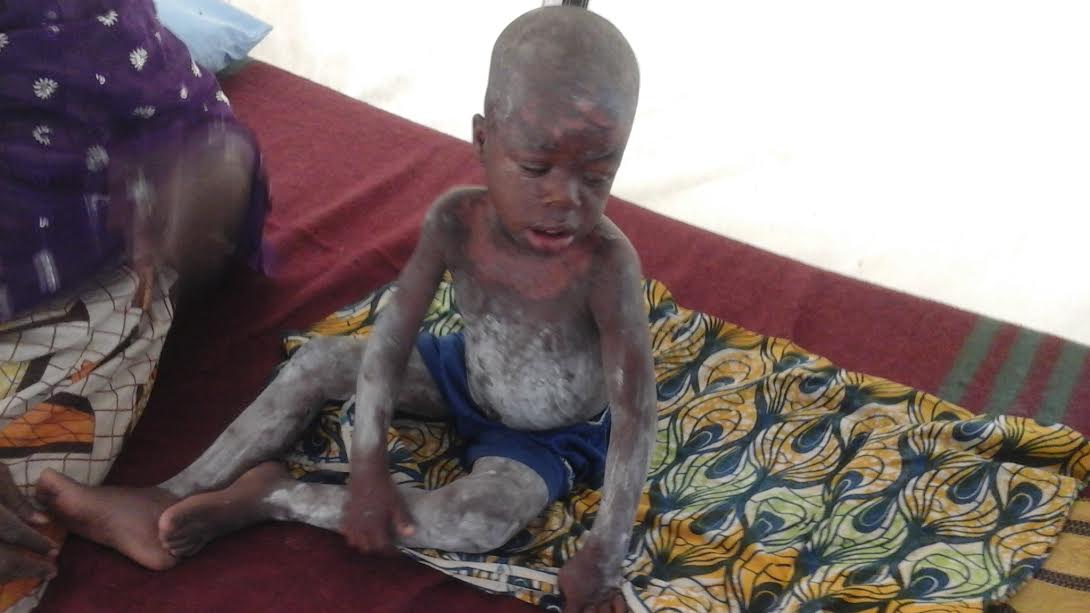
That “remarkable improvement” that Ali is making in his health condition is what IDPs need in their general living conditions. To be certain, the challenges with the grave humanitarian crisis in Borno are two: mobilising sufficient help for an IDP population that the United Nations Office for the Coordination of Humanitarian Affairs (OCHA) puts at 1.8 million, and making maximum use of the help generated so far. While the former is another kettle of fish, this investigative work shows that a number of changes must be made for the latter to happen.
It would seem that many officials at IDP camps are having a field day deciding what gets to IDPs and what doesn’t. The challenge of monitoring the effective distribution of relief aid is NEMA’s. Were NEMA to, for instance, send its own detectives to Borno to disguise as victims of insurgency, it would unearth the full scale of the rot at IDP camps. The bad eggs at IDP camps profiting from the humanitarian misfortunes of their fellow humans must be fished out and dealt with.
SEMA itself needs maybe not exactly an overhaul but surely a management reshuffle. From the testimonies of members of the public — camp officials, displaced persons, civilian JTF — it does seem the SEMA leadership, under Satomi, has lost the trust of the people. SEMA urgently needs someone who can come in to do a thorough cleanup, the type that Dora Akunyili institutionalised at National Agency for Food Drug Administration and Control (NAFDAC). To find such man of impeccable conscience and fierce love for humanity is far more complicated than it looks on the surface, but the humanitarian setup in Borno needs it badly.
Editor’s Note: All photos and videos of minors in this article were taken and published with the consent of their mothers.

